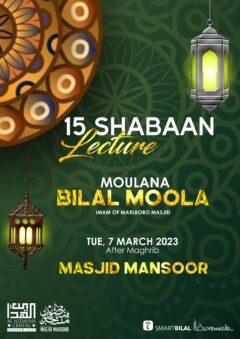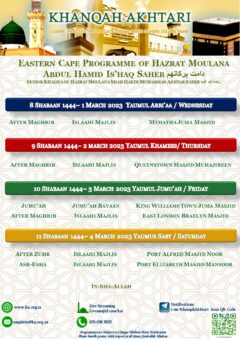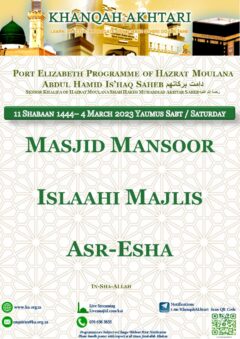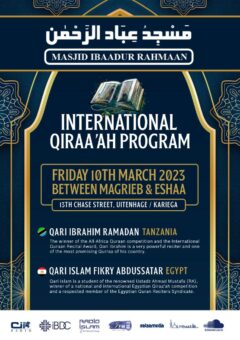Based on a post by Mufti Abdullah Nana of California, USA.
The topic is extremely crucial for the long term preservation of ‘non-government backed’ Islamic Institutions.
A recent inspirational occurrence
I recently experienced one of the most touching and inspirational acts of kindness and perpetual goodness which I have seen. An elderly Muslim couple owning a multi-million dollar home asked to meet with me to discuss an important matter. They have no children and their remaining heirs are financially well off. Their surviving heirs do not need the inheritance money that would come from this house. The couple wanted to set up a perpetual endowment (waqf) with the rental income from their house to come into effect when they both passed away. They wanted my recommendation for a worthy cause and for guidelines on how to draft a waqf deed/endowment document that would also be legally recognized in the US. After listening to my recommendations, the couple both decided that they wanted to establish a perpetual endowment for supporting scholars and promoting Islamic education, youth programs, and general educational programs for the community. May Allah reward them for their noble intention and use it a source of inspirational for all of us.
The need
We as the Muslim community in non-Islamic countries need to move away from the short-term fundraising model used by Islamic organizations, Masjids, and Madrasahs and instead move towards a long-term waqf model. Allah has truly blessed the Muslim community with tremendous wealth and prosperity, the likes of which has never been seen previously in our countries. Yet, it is sad to see so many deserving and great Islamic organizations, schools and Madrasahs continuously running on deficits and not being able to effectively serve the community.
Sometimes scholars and employees are working for months without salaries. Organizations are forced to appoint full-time fundraisers as employees and dedicate significant resources just to fund raise enough to cover expenses for one month. Unfortunately, the vast majority of Muslims donate in Ramadan alone, and organizations struggle to make these meagre amounts last all year. Our situation is not sustainable in the long term and we will not be able to continue in this way much longer.
Long term approach
The long-term approach is to invest in our future by establishing the waqf/endowment model. In this way, deserving Islamic organizations will have a steady source of income coming in to fund their activities without having to dedicate the majority of their resources to fundraising. This will free up organizations to do what they do best and actually serve the community while thinking about the long-term instead of fundraising to cover the expenses for the month. During the golden age of Islam, the waqf system ensured that medical treatment in the legendary hospitals of Baghdad was for free and the world-renowned university education in Islamic Spain was also free. We founded and perfected the endowment model, and the endowment system in place in the world’s greatest universities today can be traced to our system.
A Chinese Proverb
It is time for Muslims in the West to literally put our money where our mouth is and prove our commitment to our future generations through action and not words alone. We talk about supporting Islamic scholarship, scholars, Masjids, etc. but how many of us are willing to invest in our future by making a long-term endowment to these organizations? It is a collective obligation for us to support and fund the Madrasahs and organizations which are providing an indispensable service to the community for which there is no price tag.
A Chinese proverb states, “The best time to plant a tree was twenty years ago. The second best time is now.”
The time is now to invest in our community’s future. It is not too late. We desperately need more prosperous Muslims to follow in the footsteps of the elderly couple I mentioned above and take inspiration from them.
Perpetual Reward (Sadaqah Jariyah)
Setting up a waqf endowment is one of the best ways to invest our money and to provide us returns in the afterlife which is the real life.
Imam Muslim rahimahullah has cited the following of Hadith of Rasulullah sallallahu alaihi wa sallam together with the Hadiths that discuss perpetual endowment/waqf:
‘When a person passes away, all their good deeds come to an end except from three sources:
- Perpetual charity
- Knowledge from which benefit is derived
- A pious child who prays on their parent’s behalf.’ (Sahih Muslim, Hadith: 4199)
Initiating the Process
Moulana Muhammad Abasoomar of Darul Hadith Research Centre outlines the process of going about setting up a waqf:
- To initiate such a process, one merely needs the guidance of a qualified legal consultant and advice of a reliable Alim/Mufti. Alhamdulillah in our country we have some Ulama who are also legal consultants themselves.
- One should ensure that the endowment is not handed to unscrupulous, or unauthentic organisations.
- The designated beneficiaries of such endowments could be Masjids, Madrasahs, any Islamic organisation or even individuals, like Imams, muadhins, Ulama, teachers or pious Muslims.
Methods for making a waqf:
- A monthly contribution towards an existing waqf.
- Making a waqf of a portion of one’s wealth. This could take the form of a building, property, house, share investments, jewellery, gold coins, etc. In the case of moveable assets such as coins or jewellery, one can have them evaluated and converted to cash. The cash would then be invested in fixed property or other prudent investment.
- Making a waqf in a will. Islamic law allows you to bequeath up to one third of your estate through your will to non-heirs and worthwhile charitable causes as a legacy or a Waqf. There is freedom in choosing your beneficiary.











COMMENTS